| Listing 1 - 10 of 13 | << page >> |
Sort by
|
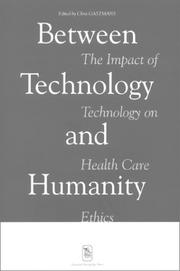
ISBN: 9789058672513 9058672514 Year: 2002 Publisher: Leuven Leuven University Press
Abstract | Keywords | Export | Availability | Bookmark
 Loading...
Loading...Choose an application
- Reference Manager
- EndNote
- RefWorks (Direct export to RefWorks)
This book highlights both the relation between technology and care, and the normative aspects of economic analyses in health care. A series of concrete examples from various clinical fields (prenatal diagnosis, genetic tests, digital imaging in psychiatry, tube feeding in care for the elderly, and palliative sedation) helps the authors to consider how to integrate these technologies in a care context aimed upon humaneness. Each topic is analysed by leading European clinicians and health care ethicists.
WB 60 Bioethics. Clinical ethics. Clinical ethics committees --- Medical Laboratory Science --- Ethics, Nursing --- Genetic Screening --- Bioethical Issues --- Congresses --- Biomedical Technology --- Ethics, Medical --- Medical technology - Moral and ethical aspects. --- Medical ethics. --- Nursing ethics. --- Genetic screening. --- Biomedical Technology - Congresses. --- Bioethical Issues - Congresses. --- Medical ethics --- Nursing ethics --- Genetic screening --- Medical technology

ISBN: 0415928370 0415928389 9780415928380 Year: 2002 Publisher: New York Routledge
Abstract | Keywords | Export | Availability | Bookmark
 Loading...
Loading...Choose an application
- Reference Manager
- EndNote
- RefWorks (Direct export to RefWorks)
Stories Matter examines the many ways that narrative methods of analysis and interpretation are transforming the work of medicine and ethics. The contributors-philosophers, literary scholars, psychologists, and physicians-offer new understandings of the implications of stories for the ethical practice of medicine. The book's double attention to theory and practice provides both clear conceptual content and a practical guide to using narrative ethics in the service of patients and their families. The doctor patient relationship starts with a story. Doctors' notes, a patient's chair, the recommendations of ethics committees and insurance justifications all hinge on written and verbal narrative interaction. The "practice" of narrative profoundly affects decision making, patient health and treatment and the everyday practice of medicine. In this edited collection, the contributors provide conceptual foundations, practical guidelines and theoretical considerations central to the practice of narrative ethics.
Pragmatics --- Medical ethics --- Bioethics --- Narration (Rhetoric) --- Psychological aspects --- Bioethics. --- Medical ethics. --- Psychological aspects. --- narrative ethics --- arts-patiëntrelatie --- relation médecin-patient --- Biomedical ethics --- Clinical ethics --- Ethics, Medical --- Health care ethics --- Medical care --- Medicine --- Professional ethics --- Nursing ethics --- Social medicine --- Biology --- Life sciences --- Life sciences ethics --- Science --- Narrative (Rhetoric) --- Narrative writing --- Rhetoric --- Discourse analysis, Narrative --- Narratees (Rhetoric) --- Moral and ethical aspects --- Narration (Rhetoric) - Psychological aspects

ISBN: 0801857805 9780801857805 Year: 2002 Publisher: Baltimore Johns Hopkins university press
Abstract | Keywords | Export | Availability | Bookmark
 Loading...
Loading...Choose an application
- Reference Manager
- EndNote
- RefWorks (Direct export to RefWorks)
In this eye-opening look at the doctor-patient decision-making process, physician and law professor Jay Katz examines the time-honored belief in the virtue of silent care and patient compliance. Historically, the doctor-patient relationship has been based on a one-way trust—despite recent judicial attempts to give patients a greater voice through the doctrine of informed consent. Katz criticizes doctors for encouraging patients to relinquish their autonomy, and demonstrates the detrimental effect their silence has on good patient care. Seeing a growing need in this age of medical science and sophisticated technology for more honest and complete communication between physician and patients, he advocates a new, informed dialogue that respects the rights and needs of both sides.
Physician-Patient Relations --- Patient Rights --- Informed Consent --- Ethics, Medical --- Physician and patient --- Silence --- Interpersonal communication --- Medical ethics --- arts-patiëntrelatie --- relation médecin-patient --- Noise --- Doctor and patient --- Doctor-patient relationships --- Patient and doctor --- Patient and physician --- Patient-doctor relationships --- Patient-physician relationships --- Patients and doctors --- Patients and physicians --- Physician-patient relationships --- Physicians and patients --- Interpersonal relations --- Fear of doctors --- Narrative medicine --- Biomedical ethics --- Clinical ethics --- Health care ethics --- Medical care --- Medicine --- Bioethics --- Professional ethics --- Nursing ethics --- Social medicine --- Communication --- Moral and ethical aspects

ISBN: 0754620468 9780754620464 Year: 2002 Publisher: Dartmouth Ashgate
Abstract | Keywords | Export | Availability | Bookmark
 Loading...
Loading...Choose an application
- Reference Manager
- EndNote
- RefWorks (Direct export to RefWorks)
A collection of articles focused on women within a general study of medicine, ethics and the law. Topics covered include: areas where the institutions of medicine, ethics and the law intersect in women's reproductive and sexual lives; the impact of legal policies and dominant ethical beliefs on many aspects of women's health; and the health practices and policies of bioethics and health law. The editors recognise that it is important not to lose sight of social differences other than gender, such as race, ethnicity, class, age, sexuality, religion, level of physical and mental ability, and family relationships. In their approach they seek to consider the lives and experiences of women as primary. Hence, they focus on the question of how women's encounters with the health-care system are structured by gender and other socially significant dimensions of their lives (rather than the question of how women differ from the male "norm").
Women --- -Women --- -Medical ethics --- #GBIB:CBMER --- gender --- vrouwen --- geneeskunde (medische aspecten) --- ethiek (ethische aspecten) --- Biomedical ethics --- Clinical ethics --- Ethics, Medical --- Health care ethics --- Medical care --- Medicine --- Bioethics --- Professional ethics --- Nursing ethics --- Social medicine --- Human females --- Wimmin --- Woman --- Womon --- Womyn --- Females --- Human beings --- Femininity --- Health and hygiene --- -Moral and ethical aspects --- Political aspects --- genre --- femmes --- médecine (aspects médicaux) --- ethique (aspects ethiques) --- Moral and ethical aspects --- Medical ethics --- Health and hygiene&delete& --- Women - Health and hygiene - Moral and ethical aspects
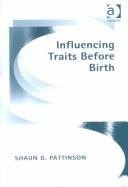
ISBN: 075462286X 9780754622864 Year: 2002 Publisher: Aldershot Ashgate
Abstract | Keywords | Export | Availability | Bookmark
 Loading...
Loading...Choose an application
- Reference Manager
- EndNote
- RefWorks (Direct export to RefWorks)
"Designer babies" are frequently reported as being on the horizon, but is it ethical to create such beings? The author explores this dilemma from a legal and ethical perspective and pays tribute to Alan Gewirth's Principle of Genetic Consistency in the process.In this text the author presents a moral critique of the laws governing the creation of "designer babies." Alan Gewirth's Principle of Generic Consistency is used as the starting point for developing a framework, which is then used to critique the legal position in the EU countries (with particular reference to the UK), Canada and the USA. The conclusion the author reaches is that a proper moral response to the issues covered must take account of specified prima facie presumptions, to be applied by legitimately appointed regulatory bodies. The text assesses the adequacy of existing regulatory responses by reference to these presumptions. Also containing detailed appendices summarizing the legal position with regard to abortion and prenatal diagnosis, preimplantation genetic diagnosis, in vitro embryo research, cloning, and germ-line gene therapy in the countries mentioned above, this volume is an indispensable resource for both students and scholars with a keen interest in this highly contested field.
Medical ethics. --- Prenatal influences. --- Reproductive technology --- Moral and ethical aspects. --- prenatale diagnostiek (prenatale test) --- pre-implantatie genetische diagnose (PGD) --- kloneren (klonen) --- embryo-onderzoek (embryo's in vitro) --- Biomedical ethics --- Clinical ethics --- Ethics, Medical --- Health care ethics --- Medical care --- Medicine --- Bioethics --- Professional ethics --- Nursing ethics --- Social medicine --- Assisted reproduction --- Reproduction --- Biotechnology --- Children --- Fetus --- Pregnancy --- diagnostic prénatal (test prénatal, DPN) --- diagnostique génétique pré-implantatoire (DPI, diagnostic préimplantatoire) --- clonage --- recherche sur l'embryon (embryons in vitro) --- Moral and ethical aspects --- Technological innovations --- Prenatal influences --- Medical ethics --- ART (Assisted reproductive technology) --- Assisted reproductive technology --- Reproductive techniques --- Reproductive technology - Moral and ethical aspects

ISBN: 9058672514 9789058672513 Year: 2002 Publisher: Leuven Leuven University Press
Abstract | Keywords | Export | Availability | Bookmark
 Loading...
Loading...Choose an application
- Reference Manager
- EndNote
- RefWorks (Direct export to RefWorks)
In the last decade health care has witnessed a host of technological novelties in the field of diagnostic and therapeutic practices, as well as in the supportive information and communication technology and in various applications of genetics, microbiology and informatics. As a result a few questions need to be answered: -Is health care ethics due dor a splitting up into an ethics of technology (focusing on the ethical implications of new technologies) and an ethics of care (focusing on the ethical problems concerning chronic diseases, decay, disability, end of life)? -How to cope with dependence, limitation, finiteness, suffering, ... in spite of technological progress? -Could a better integration of technology and care preclude situations where patients are being dehumanised? Starting with a philosophical ethical reflection about the possibilities and dangers of technologies in health care, this book highlights both the relation between technology and care, and the normative aspects of economic analyses in health care. Finally, a series of concrete examples from various clinical fields (prenatal diagnosis, genetic tests, digital imaging in psychiatry, tube feeding in care for the elderly, and palliative sedation) will help the authors to consider how to integrate these technologies in a care context aimed upon humaneness. Since each topic is analysed by leading European clinicians and health care ethicists, this book clearly stands for the interdisciplinary approach in health care ethics. This book may be a rich source of material for reflection on the role, meaning and ends of technology and care, as harmonious aspects of clinical health care practice. However, the authors main concern is to show what such a reflection may consist of and how it can contribute to the inquiry into the experience of technology, the needs of humanity and the development of appropriate health care. This book highlights both the relation between technology and care, and the normative aspects of economic analyses in health care. A series of concrete examples from various clinical fields (prenatal diagnosis, genetic tests, digital imaging in psychiatry, tube feeding in care for the elderly, and palliative sedation) helps the authors to consider how to integrate these technologies in a care context aimed upon humaneness. Each topic is analysed by leading European clinicians and health care ethicists.
Environmental protection. Environmental technology --- Hygiene. Public health. Protection --- Professional ethics. Deontology --- Ethique médicale --- Medische ethiek --- Medische technologie --- Technologie médicale --- Medical care --- Medical ethics --- Soins médicaux --- Technological innovations --- Congresses --- Innovations --- Congrès --- Medical technology --- Medical ethics. --- Nursing ethics. --- Genetic screening. --- Biomedical Technology --- Bioethical Issues --- Nursing ethics --- Genetic screening --- Moral and ethical aspects. --- bejaarden (ouderen) --- 670 Gezondheid --- Biomedical Technology. --- Health Care Rationing. --- Bioethics. --- Ethics, Medical. --- Bioethical Issues. --- 241.63*2 --- 61 --- 174.2 --- -Nursing ethics --- bio-ethiek --- gezondheidszorg --- #GGSB: Bio-ethiek --- #GBIB:CBMER --- #gsdb5 --- Caritas Catholica Vlaanderen (1982-heden) --- gezondheidszorg [verplegend] --- technologie --- abortus --- psychiatrie --- euthanasie --- christelijke ethiek --- C5 --- sociaal beleid --- 17.023.33 --- #A0301A --- 061 Ethische problemen --- biomedische technologie --- ethiek van de technologie (technologiekritiek, technologiemisbruik) --- zorgethiek (ethiek van de zorg, zorgrelatie) --- prenatale diagnostiek (prenatale test) --- genetische screening --- ouderenzorg --- palliatieve zorgen, (terminale, continue) sedatie, pijnbestrijding met levensverkortend effect, stervensbegeleiding --- Medische uitrusting --- Geneeskundige beeldvorming --- Genetica --- Psychiatrie --- Palliatieve zorgen --- Academic collection --- 603.1 --- aangeboren afwijkingen (congenitale afwijkingen, hartafwijkingen) --- abortus provocatus (vruchtafdrijving, zwangerschapsafbreking) --- dementie (dementia, dementia senilis) --- eetstoornissen --- ethiek (moraal) --- genetica --- genetisch advies --- gezondheidseconomie --- medische technologie --- palliatieve zorgen --- parenterale voeding (TPN) --- prenatale diagnose --- psychodiagnostiek --- stervensbegeleiding --- Nurses --- Nursing --- Professional ethics --- Biomedical ethics --- Clinical ethics --- Ethics, Medical --- Health care ethics --- Medicine --- Bioethics --- Social medicine --- Human chromosome abnormalities --- Medical screening --- Bioethical Issue --- Issue, Bioethical --- Issues, Bioethical --- Euthanasia --- Human Experimentation --- Patient Rights --- Animal Experimentation --- Medical Ethics --- Professionalism --- Biomedical Ethics --- Health Care Ethics --- Ethics, Biomedical --- Ethics, Health Care --- Ethicists --- Healthcare Rationing --- Rationing, Health Care --- Rationing, Healthcare --- Health Resources --- Patient Selection --- Biomedical Technologies --- Technology, Biomedical --- Technology, Health --- Technology, Health Care --- Health Care Technology --- Health Technology --- Biomedical Engineering --- Medical Informatics --- Health care technology --- Health technology --- Technology --- Theologische ethiek: medische ethiek: dokter; verpleegster; ziekenhuis --- Geneeskunde. Hygiëne. Farmacie --- Beroepsmoraal van de artsen. Medische beroepsethiek --- Moral and ethical aspects --- soins de santé --- Maatschappelijke organisaties en maatschappelijk leven --- technologie biomédicale --- éthique de la technologie (critique de la technologie, abus de la technologie) --- éthique des soins --- diagnostic prénatal (test prénatal, DPN) --- dépistage génétique --- soins des personnes âgées --- soins palliatifs, lutte contre la douleur ayant pour effet d'abréger la vie, sédation palliative (terminale, continue), accompagnement de fin de vie --- Equipement médical --- Imagerie médicale --- Génétique --- Soins palliatifs --- (zie ook: orthopedie, seksuele ontwikkelingsstoornissen, vaatziekten) --- (zie ook: genetisch advies) --- (zie ook: dood, euthanasie, palliatieve zorgen, rouw, terminale zorgen) --- Diagnosis --- ethics --- 174.2 Beroepsmoraal van de artsen. Medische beroepsethiek --- 241.63*2 Theologische ethiek: medische ethiek: dokter; verpleegster; ziekenhuis --- Soins médicaux --- Ethique médicale --- Congrès --- Health Care Rationing --- medische ethiek --- Bio-ethiek
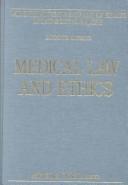

ISBN: 0754620034 9780754620037 Year: 2002 Publisher: Aldershot Ashgate
Abstract | Keywords | Export | Availability | Bookmark
 Loading...
Loading...Choose an application
- Reference Manager
- EndNote
- RefWorks (Direct export to RefWorks)
Medical laws and legislation. --- Medical ethics. --- geïnformeerde vrijwillige toestemming (instemming) --- voortplanting (reproductie) --- experiment, experimenteel onderzoek (mensen) --- levenseinde (einde van het leven, levenseindebeslissing) --- medisch recht (biomedisch recht) --- ethiek (ethische aspecten) --- Medical laws and legislation --- Medical ethics --- #GBIB:CBMER --- Biomedical ethics --- Clinical ethics --- Ethics, Medical --- Health care ethics --- Medical care --- Medicine --- Bioethics --- Professional ethics --- Nursing ethics --- Social medicine --- Law, Medical --- Medical personnel --- Medical registration and examination --- Physicians --- Surgeons --- Medical policy --- Medical jurisprudence --- consentement libre et éclairé --- procréation (reproduction) --- expérimentation sur la personne humaine (chez l'humain) --- fin de vie (décision de fin de vie) --- droit médical (droit biomédical) --- ethique (aspects ethiques) --- Moral and ethical aspects --- Legal status, laws, etc. --- Law and legislation --- Medical law --- Professional ethics. Deontology
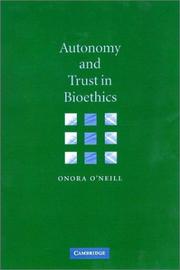
ISBN: 0521894530 0521815401 0511020082 0511176384 0511329555 0511606257 0511157150 0511045778 9786610434213 128043421X 1107125987 9780511020087 0511030444 9780511030444 9780511045776 9780511157158 9780511606250 9780521815406 9781280434211 9780521894531 9781107125988 9780511176388 9780511329555 6610434212 Year: 2002 Publisher: Cambridge : Cambridge University Press,
Abstract | Keywords | Export | Availability | Bookmark
 Loading...
Loading...Choose an application
- Reference Manager
- EndNote
- RefWorks (Direct export to RefWorks)
Why has autonomy been a leading idea in philosophical writing on bioethics, and why has trust been marginal? In this important book, Onora O'Neill suggests that the conceptions of individual autonomy so widely relied on in bioethics are philosophically and ethically inadequate, and that they undermine rather than support relations of trust. She shows how Kant's non-individualistic view of autonomy provides a stronger basis for an approach to medicine, science and biotechnology, and does not marginalize untrustworthiness, while also explaining why trustworthy individuals and institutions are often undeservingly mistrusted. Her arguments are illustrated with issues raised by practices such as the use of genetic information by the police or insurers, research using human tissues, uses of new reproductive technologies, and media practices for reporting on medicine, science and technology. Autonomy and Trust in Bioethics will appeal to a wide range of readers in ethics, bioethics and related disciplines.
Medical ethics --- Bioethics --- Autonomy --- Trust --- Philosophy --- bio-ethiek (medische, biomedische ethiek, bio-ethische aspecten) --- autonomie --- individualisme --- filosofie (filosofische aspecten) --- Kantiaanse ethiek --- vertrouwelijkheid (vertrouwelijkheidsbeginsel) --- reproductief recht (recht om zich voort te planten, recht op een kind) --- genetica (genen) --- media (pers, communicatie) --- bioéthique (éthique médicale, biomédicale, aspects bioéthiques) --- philosophie (aspects philosophiques) --- éthique kantienne (kantism) --- confidentialité (principe de confidentialité) --- droit reproductif (droit de procréer, droit à la procréation, droits de la reproduction, droit à l'enfant) --- génétique (gènes) --- médias (presse, communication) --- Autonomy. --- Bioethics. --- Medical ethics. --- Trust. --- Philosophy. --- Bioethics - Philosophy. --- Trust (Psychology) --- Attitude (Psychology) --- Emotions --- Biology --- Biomedical ethics --- Life sciences --- Life sciences ethics --- Science --- Clinical ethics --- Ethics, Medical --- Health care ethics --- Medical care --- Medicine --- Professional ethics --- Nursing ethics --- Social medicine --- Independence --- Self-government --- International law --- Political science --- Sovereignty --- Moral and ethical aspects --- Arts and Humanities --- Bioethics - Philosophy --- Droit médical
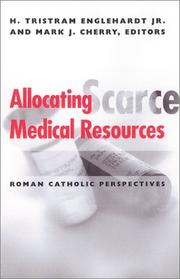
ISBN: 0878408827 9780878408825 Year: 2002 Publisher: Washington Georgetown university press
Abstract | Keywords | Export | Availability | Bookmark
 Loading...
Loading...Choose an application
- Reference Manager
- EndNote
- RefWorks (Direct export to RefWorks)
Roman Catholic moral theology is the point of departure for this multifaceted exploration of the challenge of allocating scarce medical resources. This volume begins its exploration of discerning moral limits to modern high-technology medicine with a consensus statement born of the conversations among its contributors. The seventeen essays use the example of critical care, because it offers one of the few areas in medicine where there are good clinical predictive measures regarding the likelihood of survival. As a result, the health care industry can with increasing accuracy predict the probability of saving lives - and at what cost. Because critical care involves hard choices in the face of finitude, it invites profound questions about the meaning of life, the nature of a good death, and distributive justice. For those who identify the prize of human life as immortality, the question arises as to how much effort should be invested in marginally postponing death. In a secular culture that presumes that individuals live only once, and briefly, there is an often-unacknowledged moral imperative to employ any means necessary to postpone death. The conflict between the free choice of individuals and various aspirations to equality compounds the challenge of controlling medical costs while also offering high-tech care to those who want its possible benefits. It forces society to confront anew notions of ordinary versus extraordinary, and proportionate versus disproportionate, treatment in a highly technologically structured social context. This cluster of discussions is enriched by five essays from Jewish, Orthodox Christian, and Protestant perspectives. Written by premier scholars from the United States and abroad, these essays will be valuable reading for students and scholars of bioethics and Christian moral theology.
Medical ethics. --- Christian ethics --- Catholic authors. --- 241.63*2 --- Medical ethics --- -gezondheidszorgbeleid (gezondheidszorghervorming, gezondheidszorgsysteem) --- gezondheidseconomie (gezondheidszorgeconomie) --- toegang tot de gezondheidszorg --- spoedgevallen (triage) --- ethiek (ethische aspecten) --- moraaltheologie --- theologische ethiek --- katholicisme --- jodendom (judaïsme) --- orthodox christendom --- protestantisme --- Ethical theology --- Moral theology --- Theology, Ethical --- Theology, Moral --- Christian life --- Christian philosophy --- Religious ethics --- Biomedical ethics --- Clinical ethics --- Ethics, Medical --- Health care ethics --- Medical care --- Medicine --- Bioethics --- Professional ethics --- Nursing ethics --- Social medicine --- Theologische ethiek: medische ethiek: dokter; verpleegster; ziekenhuis --- Catholic authors --- politique des soins de santé (réforme des soins de santé, système des soins de santé) --- économie de la santé (économie des soins de santé) --- accès aux soins de santé --- urgences (triage) --- ethique (aspects ethiques) --- théologie morale --- éthique théologique --- catholicisme --- judaïsme --- christianisme orthodoxe --- Moral and ethical aspects --- 241.63*2 Theologische ethiek: medische ethiek: dokter; verpleegster; ziekenhuis --- gezondheidszorgbeleid (gezondheidszorghervorming, gezondheidszorgsysteem) --- Christian ethics - Catholic authors.
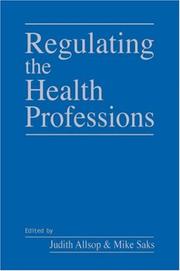
ISBN: 0761967400 9780761967408 Year: 2002 Publisher: London Sage
Abstract | Keywords | Export | Availability | Bookmark
 Loading...
Loading...Choose an application
- Reference Manager
- EndNote
- RefWorks (Direct export to RefWorks)
Medical care --- Medical policy --- Medical ethics --- Law and legislation --- -Medical ethics --- -Medical policy --- -#SBIB:316.334.3M52 --- Health care policy --- Health policy --- Medicine and state --- Policy, Medical --- Public health --- Public health policy --- State and medicine --- Science and state --- Social policy --- Biomedical ethics --- Clinical ethics --- Ethics, Medical --- Health care ethics --- Medicine --- Bioethics --- Professional ethics --- Nursing ethics --- Social medicine --- Delivery of health care --- Delivery of medical care --- Health care --- Health care delivery --- Health services --- Healthcare --- Medical and health care industry --- Medical services --- Personal health services --- -Medische sociologie: professionele aspecten van de hulpverlening --- Government policy --- Moral and ethical aspects --- #SBIB:316.334.3M52 --- Medische sociologie: professionele aspecten van de hulpverlening --- Medical care - Law and legislation - Great Britain --- Medical policy - Great Britain --- Medical ethics - Great Britain
| Listing 1 - 10 of 13 | << page >> |
Sort by
|

 Search
Search Feedback
Feedback About
About Help
Help News
News